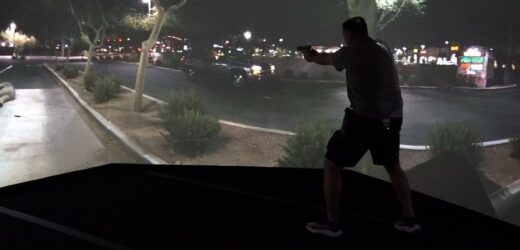North Carolina police department to study how officers make use-of-force decisions
During dangerous situations, police officers have to make split-second decisions. And one researcher at the University of North Carolina is studying how those decisions are made. The research is taking place in Waxhaw, NC, where police officers and civilians are being put to the test on a state-of-the-art virtual simulator.
WAXHAW, N.C. – Police use of force has been the subject of recent conversation and controversy. So researchers at the University of North Carolina are studying the psychology behind officers’ decision-making using a state-of-the-art simulator.
“There are five screens around you so you’ve gotta be aware of your surroundings at all times,” said Lt. Dexter Wilson of the Waxhaw Police Department.
The Virtra 300 at the Waxhaw Police Department’s headquarters is about as close as you’ll get to officer combat, without being in any real danger. Wilson uses a computer to orchestrate what’s displayed on the system’s screens in real-time.
The goal of the Virtra is to put people in hostile police situations where split-second decisions need to be made. One hundred officers and 100 everyday people are taking the test for the study. Fox News visited when a person with no police training was doing the simulation.
“Heightened awareness, everything’s going on around you 360,” said Joseph O’Sullivan, who lives in Waxhaw and found out about the study through Facebook.
Part of the study aims to see if people’s perception of how police handle use-of-force situations changes after they’re handed a fake handgun, taser, and pepper spray, and are asked to de-escalate a situation. Researchers say police officers are being brought in for the study too.
“We think that we can create more customized and more tailored use of force training,” said Dr. Lyn Exum, associate professor at the UNC Department of Justice and Criminology, who is helping oversee the research.
Exum says if put in the exact same situation, one officer may use force and one may not. And he wants to figure out why. He records each participant and asks them why they made their decisions.
“We want officers to understand that every situation doesn’t have to escalate,” Wilson said.
A grant by the Department of Justice’s Community Oriented Policing Services upgraded the Virtra 300, adding several new virtual scenarios, including ones in schools.
Exum hopes to have his results published in the first half of next year.
The hope is this research can influence how law enforcement is trained in the field. Wilson and Exum agree that you can’t make every officer respond the same way because they all have different personalities and training.
“But if we can kinda cut off some of that variability at the edges, then I think that use of force training is going to be more effective in the long run,” Exum said.
Source: Read Full Article



